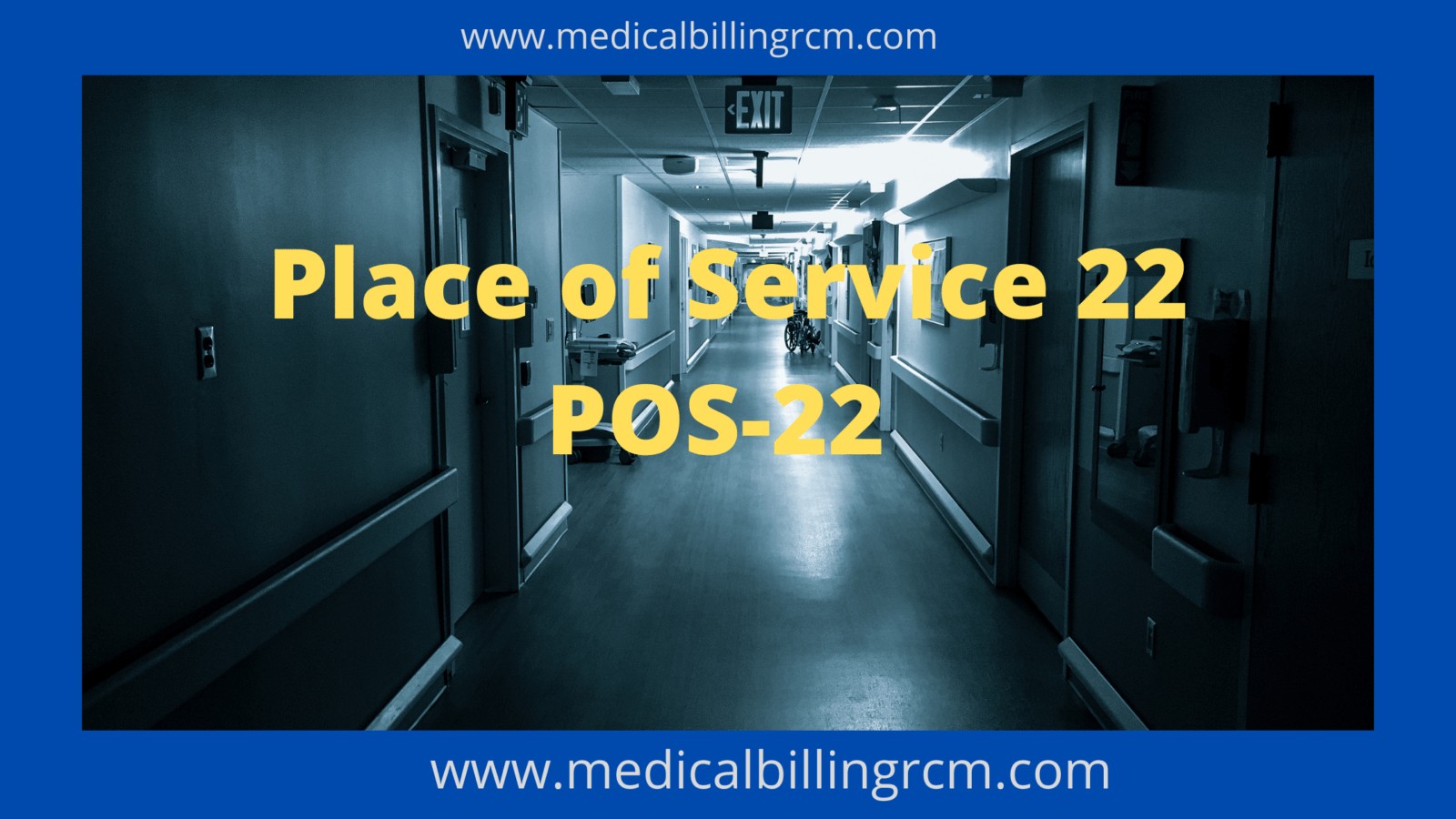For the uninformed, the abbreviation form of ‘Place of Service’ is POS. It abuts itself with a two-digit referral code (almost 99 codes are there, and each bears a different entity and allocation.) POS22 used when part of a hospital’s main campus which provides therapeutic both surgical & nonsurgical services, diagnostic, rehabilitation to sick or injured patients who do not require hospitalization. ( This Description change and effective from January 1, 2016)
POS22 refers to outpatient services provided in a hospital. This means that “patients receive medical care without being admitted to the hospital as an inpatient.”
Examples of outpatient services that may be provided in a hospital include:
- Emergency room visits
- Diagnostic tests and procedures
- Ambulatory surgery
- Infusions or injections
- Physical therapy
- Mental health services
When a patient receives outpatient services in a hospital, the billing code is POS22. This code is important because it affects how insurance companies billed and reimbursed services.
Importance of POS22
The point wise description of POS22 will help you comprehend better.
- The ‘Place of Service’ or POS is an indispensable field entered in the ‘Item 24B on the Centre for Medicare Services (CMS-1500) paper claim.
- For all the POS codes….the name, address, ZIP code (the setting where the service/ services were actually rendered) must be enrolled in Item 32 on the CMS-1500 claim form before enactment.
- The POS code is an integral part of the claim, and attention must be given while entering it during billing.
Note: If the POS code is found missing, invalid, or insensitive concerning the procedure code, then it will be denied or returned as unprocessable.
For example, suppose a provider specializing other than ’69’ bills writes a claim with Place of Service 22 (POS 22), designated for the on-campus outpatient hospital. In that case, undoubtedly, your claim will be denied.
What is an ‘on-campus outpatient hospital?’
The description unrolls that under POS 22, provisions will only be made for those services(diagnostics, rehabilitation, etc.) which are acquired on the respective hospital’s main campus.
However, the claim is issued on the ground that the beneficiary should be a sick or injured individual who doesn’t require “admittance” to the hospital.
More precisely, ‘on-campus outpatient hospital or hospitality’ is also known as ambulatory care. It is rendered to the patients who are sick, injured, or require exceptional types of testing and treatment.
They do not need to stay overnight and are eligible to be recognized in an outpatient setting only.
Constituents of ‘on-campus outpatient hospital.’
- Primary care health practitioners(Paediatricians, Gynaecologists)
- Urgent care clinics(for patients who require immediate attention)
- Specialized outpatients clinics (Arthroscopy, dental restoration)
- Pharmacies
- Emergency department
Exemples of ‘on-campus outpatient hospital’ services (POS 22)
- Wellness and prevention centers (weight loss, psychological counseling)
- Diagnostic services and tests (blood and urine laboratory tests, MRIs, CT Scan, Ultrasonography)
- Radiology corner
- Same day minor surgeries
- Chemotherapy
- Obesity clinic service
- ENT service
- Physical therapy
- Alcohol and drug abuse clinic
- Medical supplies such as splints and casts
‘On-campus outpatient hospital’ insurance
Most health insurance companies cover both inpatient and outpatient insurances.
Medicare part B makes up for on-campus outpatient hospital care.
As is known earlier, on-campus outpatient insurance is levied (under Place of Service 22) on those costs of treatments that do not need any hospitalization or institutionalization.
Barring the “admission” step, every procured facility in a hospital premise falls under the coverage of on-campus outpatient insurance.
FAQs on POS 22
Ans. Inpatient services refer to medical care requiring an overnight hospital stay. Outpatient services are provided without an overnight stay.
Ans. This depends on your insurance coverage. Some plans may cover outpatient services under your medical benefits, while others may cover them under your hospital benefits. Check with your insurance provider to understand your coverage.
Ans. Place of Service 22 affects how insurance companies billed and reimbursed services. Depending on your insurance coverage, you may be responsible for paying a portion of the cost out-of-pocket.
Conclusion:
Formerly, POS22 was described as the only “outpatient hospital.” Still, recently, the prefix ‘on-campus’ has been added to differentiate the service cost from the one under Place of Service 19 (off-campus outpatient hospital).
Related Articles:
- POS 61| Place Of Service 61 in Medical Billing
- Place of Service 20 – POS 20 in Medical Billing 2026
- POS 34 | Place of Service 34 in Medical Billing
- Place of Service 19 | POS 19 Description in Medical Billing (2026)
- Place of Service 24 – POS 24 in Medical Billing (2026)
The author and contributor of this blog "NSingh" is working in Medical Billing and Coding since 2010. He is MBA in marketing and Having vaste experience in different scopes of Medical Billing and Coding as AR-Follow-up, Payment Posting, Charge posting, Coding, etc.

